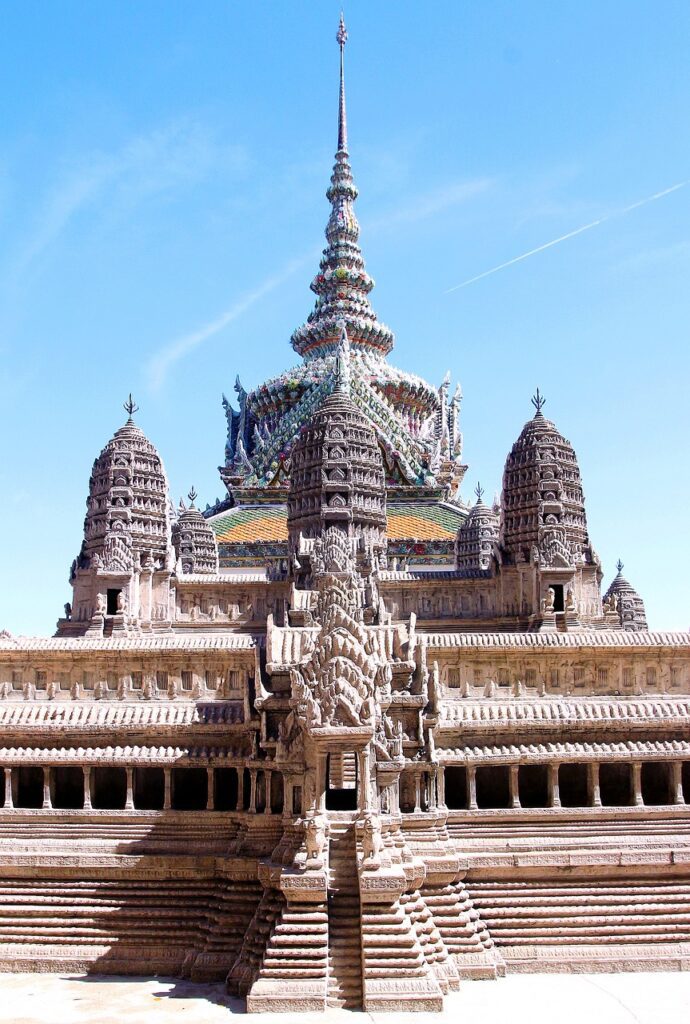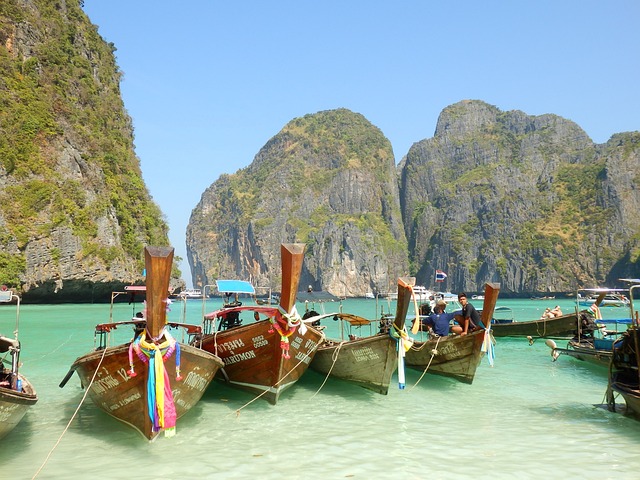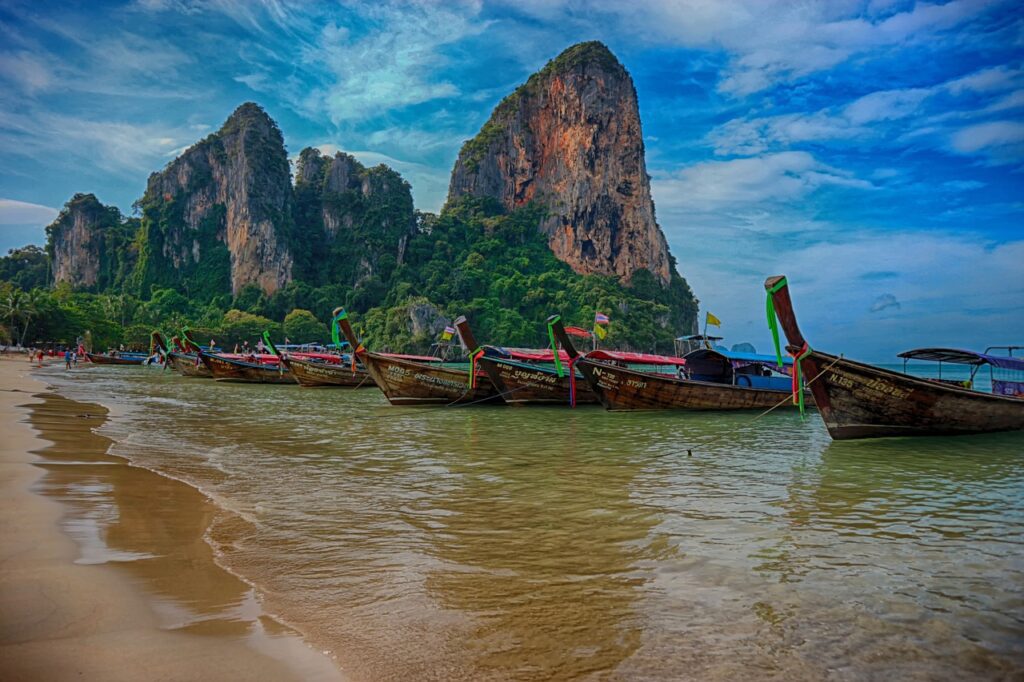Koh Samui, a tropical paradise nestled in the Gulf of Thailand, is famed for its stunning beaches, crystal-clear waters, and luxurious resorts. But beyond the breathtaking landscapes and relaxing ambiance lies something even more enriching—the deep and vibrant Thai culture that shapes life on the island. Rooted in centuries-old traditions, Buddhist values, and a strong sense of community, the culture of Koh Samui offers a unique opportunity to connect on a deeper level with Thailand’s heart and soul.

Whether you’re visiting for a short stay or making this island your long-term home, immersing yourself in local customs and traditions will greatly enhance your experience. From exploring the serene Buddhist temples to participating in colorful festivals, Koh Samui offers countless opportunities to embrace the Thai way of life. In this article, we’ll dive into the essential aspects of Thai culture and share tips on how to fully engage with it, making your time on the island truly unforgettable.
Key Elements of Thai Culture in Koh Samui
Thai culture is deeply rooted in respect, community values, and spiritual beliefs. These elements shape daily life and interactions, providing a unique opportunity to connect meaningfully with the people of Koh Samui. Understanding these cultural foundations will not only enrich your time on the island but also help you navigate social settings with ease. Let’s explore some of the most important aspects of Thai culture you’ll encounter in Koh Samui.
1. The Importance of Buddhism
At the heart of Thai culture is Buddhism, and in Koh Samui, you’ll find numerous temples that serve as the spiritual centers of the community. Prominent sites like Wat Plai Laem and the famous Big Buddha Temple (Wat Phra Yai) are not only places of worship but also key cultural landmarks. Here, locals come to pray, meditate, and offer alms to monks—a practice that has been central to Thai life for centuries.
To fully experience this side of Thai culture, visiting a temple is a must. When doing so, it’s essential to follow cultural practices that show respect: dress modestly, covering your shoulders and knees, and remove your shoes before entering temple grounds. Additionally, keep your head lower than images of Buddha and the monks, as a sign of humility. Many visitors find that offering a small donation or lighting incense is a powerful way to engage in the Buddhist traditions that guide everyday life in Thailand.
2. Thai Language and Greetings
In Koh Samui, a little effort to speak the local language goes a long way in building relationships and showing respect. While many locals in tourist areas speak English, learning basic Thai phrases is highly appreciated. The most common greeting is the wai, where you place your palms together in a prayer-like gesture, followed by a slight bow. You’ll hear the word sawasdee (hello) and khop khun (thank you) frequently.
While mastering the language is not necessary, trying simple phrases such as sabai dee mai (how are you?) or mai pen rai (it’s okay) can make a big difference. Thai culture places a great emphasis on politeness and modesty, and making an effort to speak Thai fosters a deeper connection with the local community. It’s also a sign of respect and curiosity toward their culture.
3. Thai Cuisine: A Cultural Experience
One of the most enjoyable ways to immerse yourself in Thai culture is through food. Thai cuisine is world-renowned for its bold and balanced flavors—combining sweet, salty, spicy, and sour into every dish. Koh Samui offers a diverse culinary landscape, from vibrant street food stalls to high-end restaurants serving classic dishes like Tom Yum Goong (spicy shrimp soup), Pad Thai, and the beloved Som Tum (papaya salad).
For those wanting a deeper connection with the local food culture, taking a Thai cooking class is a fantastic experience. These classes not only teach you how to prepare traditional dishes, but also provide insight into the rich culinary heritage of Thailand. Learning to cook with fresh, local ingredients like lemongrass, galangal, and coconut milk will give you a lasting appreciation for the intricacies of Thai cuisine, while also allowing you to bring a bit of Thai culture home with you.
4. Festivals and Celebrations
Festivals in Koh Samui are an exciting way to experience Thai culture in its most vibrant and joyous form. Songkran, celebrated in mid-April, marks the Thai New Year and is one of the country’s biggest festivals. The celebration involves massive water fights in the streets, which are symbolic of washing away the old year’s misfortunes and welcoming new beginnings. You’ll find locals and tourists alike joyfully splashing each other, while also visiting temples to make merit and receive blessings.
Another significant festival is Loy Krathong, which takes place in November. During Loy Krathong, participants release beautifully decorated baskets (krathongs) onto rivers, lakes, or the sea as a gesture of gratitude to the water goddess. The sight of thousands of lit krathongs floating under the moonlight is breathtaking and provides a moment of reflection and renewal.
Participating in these festivals allows you to experience the deep-rooted traditions and community spirit that define Thai culture. They are times of joy, togetherness, and spiritual reflection, making them perfect opportunities to immerse yourself in local life.

5. Thai Etiquette and Social Norms
Thai culture is based on respect and humility, particularly when it comes to social interactions. Thai people value harmony and avoid confrontation, so it’s important to remain calm and composed in public settings. When interacting with locals, showing respect through body language is crucial. Avoid touching people’s heads (the head is considered the most sacred part of the body) and refrain from pointing your feet at anyone or at religious objects, as this is seen as offensive.
Politeness is highly valued, and Thai people often express this through the concept of saving face—avoiding actions or words that could embarrass or offend others. In everyday situations, a smile and a gentle demeanor go a long way in building positive relationships. Understanding these social norms will not only help you integrate more smoothly into local life but also allow you to engage with Thai culture in a meaningful and respectful way.
By embracing these key elements of Thai culture—from Buddhism and language to cuisine and festivals—you’ll gain a deeper understanding of the values that shape life on Koh Samui. Whether you’re visiting the island or making it your home, engaging with these traditions will enhance your experience and foster connections with the local community.
Ways to Immerse Yourself in Thai Culture in Koh Samui
Now that we’ve explored the key elements of Thai culture, here are some practical ways to truly immerse yourself in the local way of life while living or visiting Koh Samui. These experiences will help deepen your understanding and appreciation of Thailand’s rich traditions.
1. Visit Local Temples and Participate in Rituals
One of the most profound ways to engage with Thai culture is by visiting the island’s many Buddhist temples. Wat Plai Laem and Wat Khunaram, where the famous mummified monk is on display, are among the island’s most revered spiritual sites. Visitors are welcome to observe or participate in traditional rituals, offering a window into the deep spirituality that shapes daily life in Koh Samui.
Consider joining the locals during the morning alms rounds, when monks walk the streets to receive food offerings. This ancient practice reflects the values of humility, generosity, and respect central to Buddhism. Additionally, temples host special ceremonies during religious festivals like Songkran and Loy Krathong, allowing you to participate in these joyous and meaningful events.
Being a respectful observer, dressing modestly, and following local customs when visiting temples will not only enhance your cultural immersion but also give you a deeper appreciation for the spiritual dimension of Thai culture.
2. Take a Thai Language Class
Although many locals in Koh Samui speak English, learning some basic Thai language will enrich your experience on the island and help bridge the cultural gap. Taking a Thai language class allows you to better communicate with locals and demonstrates your respect for their culture. Even learning simple phrases like sawasdee (hello) and khop khun (thank you) can go a long way in building rapport.
Beyond just language, these classes often introduce cultural nuances that help you navigate daily interactions. Understanding concepts like kreng jai (a Thai value that prioritizes being considerate of others’ feelings) will make your cultural exchanges more meaningful. By taking the time to learn Thai, you show a commitment to engaging with the local community in an authentic way.
3. Engage with the Local Community
Becoming part of the local community in Koh Samui is one of the best ways to truly immerse yourself in the island’s culture. Many expats and locals participate in community-driven events such as beach cleanups, charity fundraisers, and wellness activities like group yoga or fitness sessions. These gatherings provide an excellent opportunity to connect with people from all walks of life while contributing to the island’s well-being.
For instance, joining a beach cleanup not only helps preserve the island’s beauty but also fosters a sense of responsibility and camaraderie with the locals. Attending cultural festivals and volunteering for local causes also allow you to experience the heart of Thai community life, where collective action and social harmony are deeply valued.
Engaging with the local community is a rewarding way to build lasting friendships, while also gaining insight into the island’s unique cultural blend of Thai traditions and international influences.
4. Explore Traditional Markets
One of the most exciting ways to immerse yourself in Thai culture is by visiting the island’s traditional markets. Markets like Fisherman’s Village Walking Street or the lively Lamai Night Market offer a sensory overload of sights, sounds, and smells. These bustling hubs of activity are where locals and visitors alike come to shop, eat, and socialize, making them perfect for cultural exploration.
Strolling through these markets gives you a firsthand look at local life—vendors selling fresh produce, street food stalls dishing up authentic Thai cuisine, and artisans crafting handmade goods. Try iconic dishes like Som Tum (papaya salad) or Pad Thai, and don’t be shy to chat with vendors to learn more about the ingredients or their preparation methods.
In addition to food, you’ll find beautiful handicrafts, traditional clothing, and souvenirs that reflect the island’s rich culture. Visiting local markets is a fantastic way to support small businesses, connect with the community, and fully experience the vibrant energy of Thai market culture.
Exploring these different facets of Thai culture—from temple visits and language learning to community involvement and market adventures—will enrich your time in Koh Samui. Engaging with the local way of life will provide you with a deeper appreciation of the traditions and values that make Thailand such a culturally rich and inviting destination.

Heveatecture’s Commitment to Cultural Harmony in Koh Samui
When building a villa or designing a property in Koh Samui, it’s essential to consider not only the architectural aspects but also how the space fits within the island’s rich Thai culture. At Heveatecture, we believe that every project should be in harmony with the local environment and cultural heritage. Our designs are deeply inspired by the island’s traditional aesthetics, integrating modern luxury with local customs and respect for Thai spirituality.
Incorporating Local Traditions into Design
From the beginning, Heveatecture places great emphasis on incorporating local materials and design elements that reflect the essence of Thai architecture. Many of our villas feature open-air spaces and natural materials like wood and stone, echoing the island’s connection to nature. Large windows and open terraces are crafted to invite the breathtaking views of Koh Samui while paying homage to the simplicity and elegance found in Thai design.
Additionally, we incorporate symbolic elements such as water features or serene garden spaces inspired by Buddhist principles, creating a sense of peace and tranquility in each villa. This blend of modern functionality and cultural reverence makes each project not just a luxurious living space but a home that feels deeply connected to the spirit of the island.
Respecting Spiritual Spaces and Local Communities
In all our projects, Heveatecture is committed to respecting local customs and the spiritual significance of certain locations. We carefully consider the placement of structures to avoid disturbing sacred sites and ensure that the designs align with the island’s natural beauty. This respect for cultural values fosters positive relationships with the local community, making our villas not only a part of the landscape but also a part of the island’s cultural tapestry.
Our approach is about more than just aesthetics; it’s about creating spaces where residents and visitors can truly experience the depth of Thai culture while enjoying the comfort and innovation that Heveatecture brings to each project.

Conclusion
Living in Koh Samui offers far more than scenic beaches and luxury resorts—it provides a gateway to a rich, vibrant Thai culture that is deeply rooted in tradition, spirituality, and community. By immersing yourself in local customs, visiting Buddhist temples, participating in festivals like Songkran and Loy Krathong, and engaging with the local community, you’ll foster a deeper connection to the Thai way of life.
Taking the time to learn basic Thai language, exploring traditional markets, and showing respect for cultural norms will transform your experience on the island, allowing you to feel more integrated and at home. Koh Samui offers countless opportunities to embrace the warmth and wisdom of Thai culture, enriching your everyday life and creating meaningful memories along the way.
FAQ
Buddhism plays a central role in Thai culture, and Koh Samui is home to several important temples where locals practice their faith through prayer, offerings, and meditation. Visiting temples like Wat Plai Laem and the Big Buddha can give you insight into local spiritual life.
When visiting a temple, dress modestly, covering your shoulders and knees. Remove your shoes before entering, and keep your head lower than images of the Buddha. It’s also respectful to remain quiet and avoid touching religious statues.
The traditional Thai greeting is the wai, where you place your palms together and slightly bow. It’s often used when saying “hello” (sawasdee) or “thank you” (khop khun), and it shows respect in both casual and formal settings.
Songkran (Thai New Year) in April and Loy Krathong in November are two of the most celebrated festivals on the island. Songkran involves lively water fights and religious rituals, while Loy Krathong is a more peaceful event where locals release floating baskets into the water.
Yes, many temples welcome visitors to observe or participate in rituals like offering alms to monks or lighting incense during religious ceremonies. Being a respectful participant provides a meaningful way to connect with Thai culture.
While you can get by with English, learning basic Thai phrases is appreciated by locals and enhances your experience. Simple greetings or thanking people in Thai can help build rapport and show respect for the local culture.
You can engage with the Koh Samui community by participating in local events like beach cleanups, attending cultural festivals, or joining social clubs. These activities allow you to connect with both locals and expats.
Traditional markets in Koh Samui like Fisherman’s Village Walking Street or Lamai Night Market offer a lively experience where you can shop for fresh produce, try Thai street food, and buy handmade goods, while mingling with locals.
Yes, bargaining is common in Thai markets. However, it’s important to remain polite and lighthearted during negotiations. Most vendors expect some negotiation, especially at markets, but always be respectful and mindful of fair prices.
Key aspects of Thai etiquette include showing respect to elders, avoiding physical contact with the head (which is considered sacred), and not pointing your feet at people or religious objects. Maintaining a calm and polite demeanor is highly valued in Thai culture.
